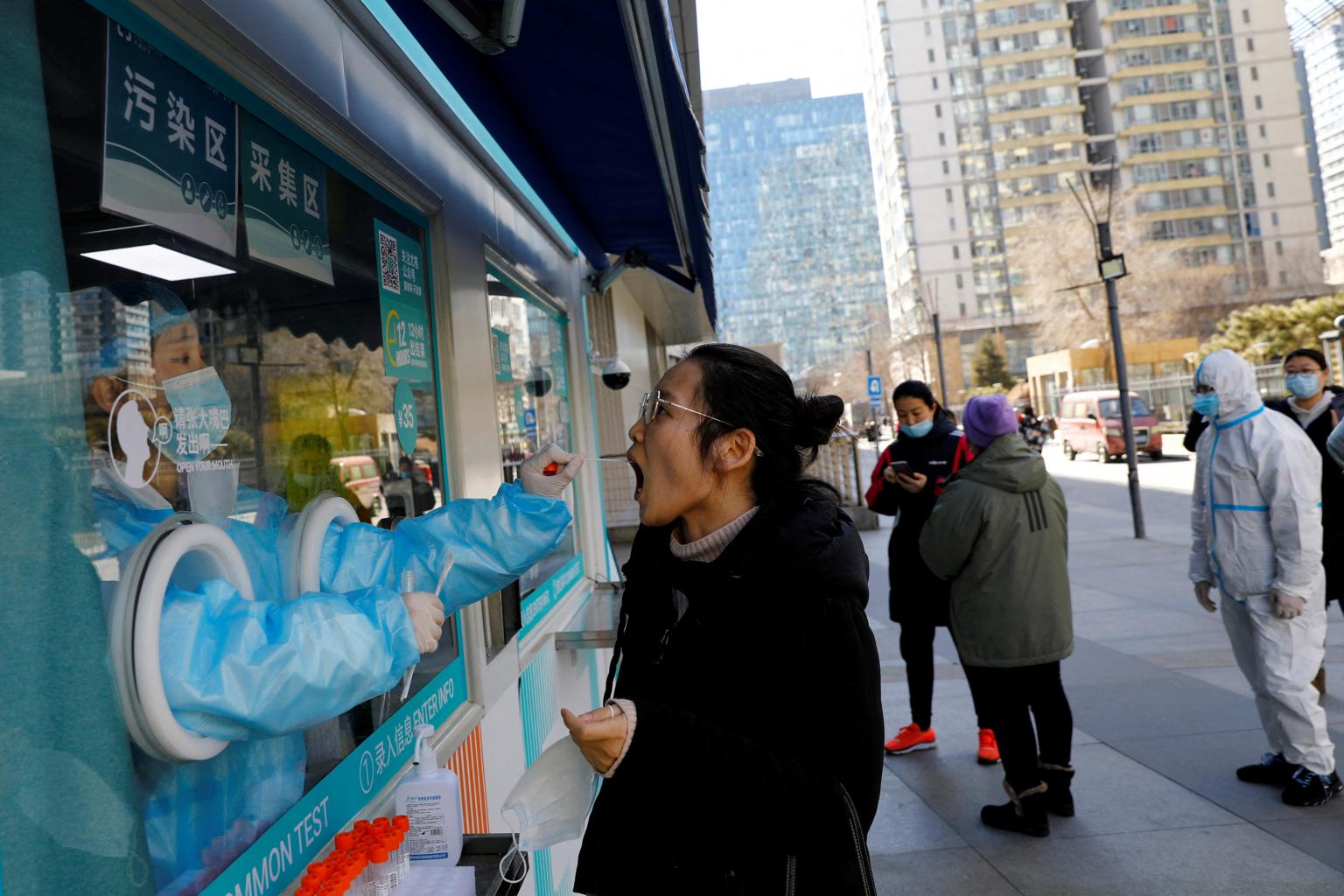China shuts schools in Shanghai as Covid-19 cases cross 1,000
Sign up now: Get ST's newsletters delivered to your inbox

The caseload has blown up from a little over 300 to more than 1,000 in less than a week.
PHOTO: REUTERS
Follow topic:
BEIJING (BLOOMBERG) - China has suspended in-person classes for all students up to middle school in the financial hub of Shanghai from Saturday (March 12), as the highly infectious Omicron variant drives a Covid-19 outbreak at a scale only seen at the peak of the start of the pandemic in Wuhan.
The country reported 1,100 domestic infections on Friday, data from the National Health Commission showed. The tally has ballooned from just over 300 cases a day in less than a week, presenting a significant challenge to China’s ongoing, zero-tolerance approach to the virus.
Local authorities also locked down the Changchun city in the northeastern part of the country.
The Covid-19 Zero strategy that helped keep China largely virus-free for much of the pandemic now appears to be buckling as Omicron repeatedly breaks through one of the the world’s most stringent remaining containment regimes.
Covid-19’s spread in the nation’s biggest cities, including financial hub Shanghai, also makes it difficult to deploy the aggressive but disruptive restrictions officials are increasingly turning to, chief among them lockdowns.
Despite the swelling outbreak, China is seeing more people infected without obvious symptoms than those who are sickened by the virus – likely resulting from Omicron’s diminished virulence and China’s mass vaccination drive that has seen nearly 90 per cent of its 1.4 billion people fully inoculated with locally-developed shots and more than one-third boosted. Of Friday’s cases, 703 were asymptomatic.
An outbreak in the northeastern province of Jilin – which borders Russia and North Korea – has seen authorities move quickly to build three makeshift hospitals with a capacity for some 1,200 beds. The provincial capital Changchun, a city of 9 million people, was put into a lockdown on Friday, with residents asked to stay home while the city conducts three rounds of mass testing.
China famously erected a number of temporary hospitals in Wuhan in 2020, some built in as little as 10 days and then used to treat moderate and severe patients. China’s policy is still to isolate all cases of Covid-19, regardless of severity, to contain further spread.
That approach will be maintained, according to a person familiar with the country’s plans, and places that are experiencing strong outbreaks should consider building temporary hospitals, especially to isolate cases with no symptoms. That would leave actual hospitals designated to deal with Covid-19 free for the more severe cases.
The eastern port city of Qingdao is also building multiple makeshift hospitals amid Omicron’s explosive spread in a number of schools. Local officials and school heads there have received disciplinary warnings for failing to tame the outbreak.
Meanwhile in Shanghai, which is confronting its worst outbreak of the pandemic, authorities are testing students from kindergarten to college and have moved all students up to middle school to online teaching starting this weekend.
Officials in the metropolis have largely refrained from deploying the sweeping curbs commonly used in smaller cities, such as lockdowns, but the growing outbreak may test the limit of this more targeted response.
Not in Community
Most of the newly reported infections in Shanghai are among people who have already been isolated, a person familiar with China’s response said, for being a close contact of a case, for example.
Just two of the 75 Covid-19 cases reported in the city on Friday were in the community, which may explain why authorities have not intensified their response or deployed city-wide testing as yet. Bigger cities with sophisticated contact-tracing capacity will not necessarily deploy mass testing as long as the outbreak is considered to be limited and under control, the person said.
Chinese Premier Li Keqiang said on Friday that the world should be working more closely together to create the conditions for a return to normal post-pandemic. In a press conference marking the end of the annual National People’s Congress in Beijing, he said officials will work to make China’s response more scientific and targeted and to maintain the normal functioning of everyday life and supply chains.
Repeated mass testing of workers in the northeast city of Tianjin in January saw Toyota Motor Corp halt production there for about 10 days, contributing to a 15 per cent drop in output for the Japanese car giant that month.
Mass testing is a key tool in the Covid-19 Zero arsenal as it helps root out infections quickly and among asymptomatic people.
Stocks tied to the prospect of China reopening, including airlines, travel companies and restaurants fell on Friday. Air China Ltd dropped as much as 4.2 per cent, Trip.com Group Ltd slumped 13 per cent and hot-pot chain Haidilao International Holding Ltd shed 10 per cent.
Shares related to virus testing surged. Shanghai Labway Clinical Laboratory Co surged 20 per cent and Hangzhou Biotest Biotech Co climbed as much as 14 per cent.
Beijing recently pledged it would be sticking to Covid-19 Zero, even as other parts of the world dismantle pandemic curbs and open up – leaving China isolated.
Still, there are signs the country’s health officials and experts are at least considering how they may exit the approach and live with the virus as endemic. China approved the antiviral pill Paxlovid developed by Pfizer Inc last month, a move seen by many as evidence of that planning.

